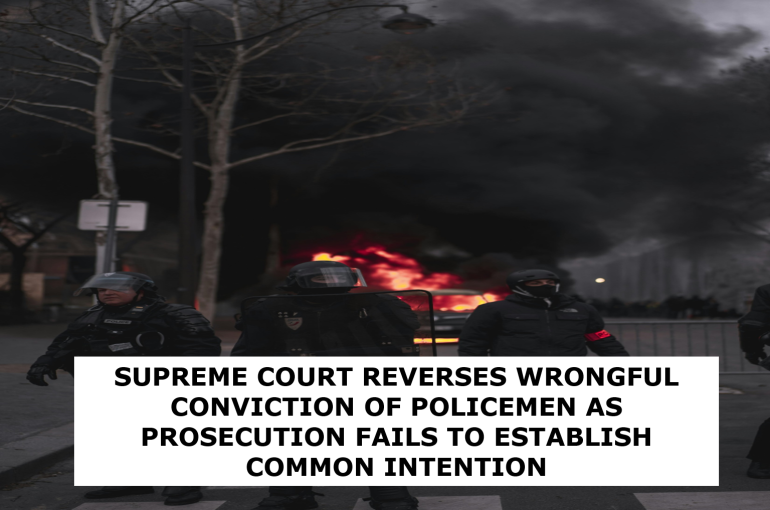SUPREME COURT REVERSES WRONGFUL CONVICTION OF POLICEMEN AS PROSECUTION FAILS TO ESTABLISH COMMON INTENTION
A two Judge Bench of the Hon’ble Supreme Court comprising of Justice B.R. Gavai and Justice Augustine George Masih passed a judgement dated 28.01.2025 in the matter of Constable 907 Surendra Singh & Anr. v. State of Uttarakhand Criminal Appeal No. 355 Of 2013 wherein the Bench held that all Accused persons cannot be convicted for the same offence if the prosecution fails to prove the common intention between the Accused.
Facts
The case originated from an incident on 15.11.2004, in which a police team attempted to intercept a car bearing registration No. DL2CR4766 suspected for smuggling of liquor in Rishikesh. On receipt of the information, Head Constable Jagdish Singh (Accused No. 1) along-with other Accused- Constable Surendra Singh, Constable Surat Singh and Constable Driver Ashad Singh tried to chase and intercept the suspected car. Subsequently, Head Constable Jagdish Singh fired a bullet in order to stop the car, which unfortunately hit Manisha Chauhan (the victim), a co-passenger in the car, causing her death.
A FIR bearing no. 455 of 2004 was lodged on 16.11.2004, against Jagdish Singh and unknown police officers under Section 302 of the Indian Penal Code 1860 (IPC) (Punishment for Murder). The Sessions Court, Dehradun (Trial Court) convicted Jagdish Singh for murder under Section 302 IPC and Section 27(1) Arms Act) (Punishment for using arms, etc.) and imprisoned him for life. However, the Ld. Trial Court acquitted the other Accused persons since the Prosecution had failed to prove the case beyond reasonable doubt insofar as they were concerned.
Being aggrieved of the conviction, Accused No. 1 filed Criminal Appeals in the High Court of Uttarakhand and the State of Uttarakhand appealed against the acquittal of other Accused persons in the High Court.
The Hon’ble High Court of Uttarakhand allowed the Appeal filed by the State and reversed the acquittal and convicted all the Accused under Section 302 IPC read with Section 34 IPC (Acts done by several persons in furtherance of common intention), sentencing them to life imprisonment. The Hon’ble High Court stated that their presence in the same vehicle as the prime Accused was sufficient to infer common intention.
Thus, the Appellants (three constables) challenged their conviction in the Hon’ble Supreme Court.
Issues
1) Whether the High Court erred in convicting all the Accused persons jointly for the same offence?
2) Whether merely being present in a car would be sufficient to prove the common intention of all the Accused?
Decision by the Supreme Court
The Apex Court on reviewing the facts and circumstances of the case observed that there was absence of common intention between the Accused persons. The Ld. Trial Court had acquitted the Appellants because there was no evidence proving that they shared a common intention with Jagdish Singh. It was also noted that the High Court convicted the Appellants solely because they were present in the vehicle at the time of commission of offence. The Supreme Court ruled that mere presence in the vehicle does not establish common intention.
The second issue with conviction was the lack of eyewitness’ testimony and identification. The Prosecution relied on eyewitness testimonies from Sanjeev Chauhan (husband of the deceased) and K.M. Bharti (sister-in-law). However, only one witness identified one of the Accused i.e. Ashad Singh, who was the driver of the car and there was no independent witness from the public. The Ld. Trial Court had also found that the identification was insufficient to establish guilt beyond a reasonable doubt.
The Hon’ble Supreme Court reiterated that a Court must interfere in the judgement of acquittal only if the judgment is perverse or based on a misreading of evidence. Since the Trial Court’s acquittal was based on reasonable grounds, the High Court’s interference was unwarranted.
The Hon’ble Bench also held that the Appellants were following orders from their superior (Jagdish Singh) and cannot be said to have an ill-motive towards the victim.
Thus, there was no evidence that they planned or intended to commit murder and hence, the Appeals were allowed. Furthermore, the Appellants were discharged on bail.
Conclusion
The Supreme Court set aside the conviction by the Hon’ble High Court and reinstated the Judgement and Order by the Trial Court. The Apex Court also emphasized that conviction under Section 34 IPC requires clear proof of common intention, which was absent in this case. The High Court’s decision was overturned, and the Appellants were acquitted, reaffirming the principle that mere presence at a crime scene does not establish guilt.
ARJAV JAIN
ASSOCIATE
THE INDIAN LAWYER & ALLIED SERVICES
Please log on to our YouTube channel The Indian Lawyer Legal Tips and learn about different aspects of the law. Our latest video is on “Law on Ancestral Property” that may be viewed on the link below:





































Leave a Reply